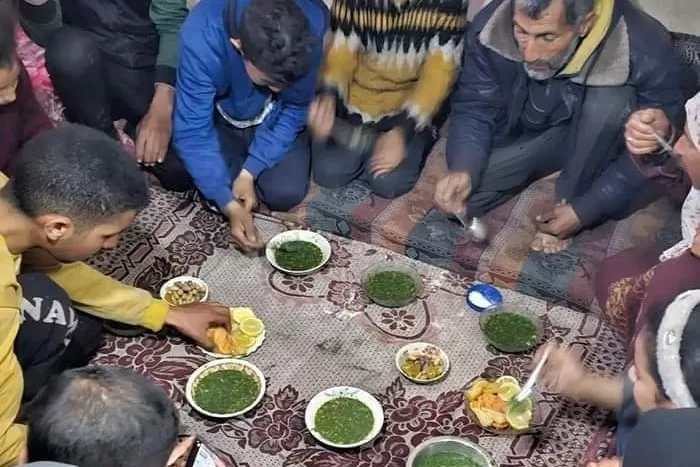When Shakya Lahrech saw a photo of a family in Gaza eating grass and lemon soup to break their fast during Ramadan, it reinforced her decision to fast in solidarity.
The 24-year-old student from Melbourne is not Muslim, but this year she’s abstaining from food and water from dusk till dawn for the holy month for the first time.
And it’s given her a new perspective.
“I can’t even understand 1 per cent of what the Palestinians are going through [in Gaza],” Shakya says.
“But to voluntarily put yourself through hunger to attempt to scratch the surface of what starvation must feel like, I think is really important.”
She’s part of a global movement of non-Muslim people who have chosen to fast to stand with the people of Gaza.
The hashtag #FastForGaza started last month after several influencers decided to partake in the fast.
“As humans, it’s important that we do things like this for each other to help us be more caring, empathetic, and more understanding,” Shakya tells the ABC.
Her two Muslim friends inspired her and she says the concept of fasting to empathise with the less fortunate is “beautiful”.
It’s also been a way for her to initiate conversations about what’s happening in Gaza.
“People ask me, like, ‘oh, but you’re not Muslim, why are you fasting?’ and it’s just such a fantastic way to insert conversations around Palestine.”
Shakya, along with many others participating for the first time, say the hardest part is not being able to drink water.
For her, it puts into perspective what those in Gaza are going through.
“Even though I’m fasting, I still have food, clean water, clean air. There’s just an endless amount of things to be grateful for.
“This process has allowed me to deepen my understanding of my own privilege.”
‘It’s not a gesture of sympathy’
Suveen Sanis Walgampola is Buddhist but is also fasting for the first time this year.
“Gaza was the catalyst. As the situation goes into narratives of famine and starvation it just felt right,” he says.
The United Nations and the United States have warned that famine in largely isolated northern Gaza is imminent.
Currently living in New Zealand with his two Muslim roommates, Suveen says it’s been a uniting experience for them to fast as household.
He says it’s made him appreciate the small things.
“It almost sheds away layers and you’re left with the very bareness of consciousness. You’re so intentional with everything you do.
“Participating in Ramadan has enlightened me to so much.”
But the movement is not just about sympathising with the people of Gaza but rather validating their hardship, Suveen says.
“It’s not a gesture of sympathy, but rather an acknowledgement of the collective liberation movement and the strength that is within Palestine.”
Baha’i, Christians and Muslims fasting at same time
This year, various religious observances have overlapped, meaning people of Christian, Muslim and Baha’i faiths have been fasting at the same time.
Jason Damouni is a Palestinian Christian who has been observing 40 days of Lent as part of Easter celebrations.
“We as Melkite Catholics and Orthodox Christians, we gave up meats and dairy, so we’re essentially vegan until Easter,” Jason says.
“Then on top of those dietary rules, the fasting occurs between Monday and Friday from sunrise to sunset.”
He says this year’s fasting has given him “a chance to reflect and renew” and be in solidarity with those who do not have food and are going through “a literal famine right now”.
“It’s still meaningful every year, but given the situation in Gaza, lots of our thoughts, prayers, and reflections are centred around Palestine,” he says.
He says Christians are also suffering in Gaza, and that he had distant relatives who had been killed by “Israeli sniper fire outside the Holy Family Church in Gaza” late last year.
“I’m blessed with a roof over my head, with roads that I don’t have to go through military checkpoints to get to work, get to church,” he says.
“Something as simple as that, that Australians take for granted is something that Palestinians don’t have.”
Those from the Baha’i faith — a religion that focuses on how humanity is one family bound together based on the teachings of their founder, Baha’u’llah — fast every year in March.
Similar to Muslims during Ramadan, they fast from sunrise to sunset for 19 days and end with a new year celebration called Nawruz.
Tim Wood is a PhD researcher at the University of Melbourne and a member of the Baha’i faith.
He says fasting “has felt different this year” and that the Israel-Gaza war, and people experiencing famine, has made him more mindful when he abstains from food and drink.
The Israel-Gaza war has also temporarily impacted their pilgrimage to the Baha’i World Centre located in Israel, which is the spiritual and administrative centre of the Baha’i faith.
“[What the] Baha’is are trying to do is to work together with brothers and sisters of every faith and no faith to labour for the betterment of the world.”
‘I break my fast in secret’
While others have been able to fast in the open, Orthodox Christian high school teacher Catherine from Melbourne’s north is fasting for Gaza behind closed doors.
“I break my fast in secret,” she says.
Catherine, whose name has been changed to protect her identity, says if her parents knew she was fasting they wouldn’t agree with her decision.
“The religion [Islam] is beautiful,” she says.
Her students are predominantly Muslim and she says fasting during Ramadan helps her understand them better and what they experience during the month.
But this year, she says she’s doing it for Gaza, and encourages everybody to give it a try.
“[Fasting] really makes you understand how others who are less fortunate feel.
“Everybody should try it.”
